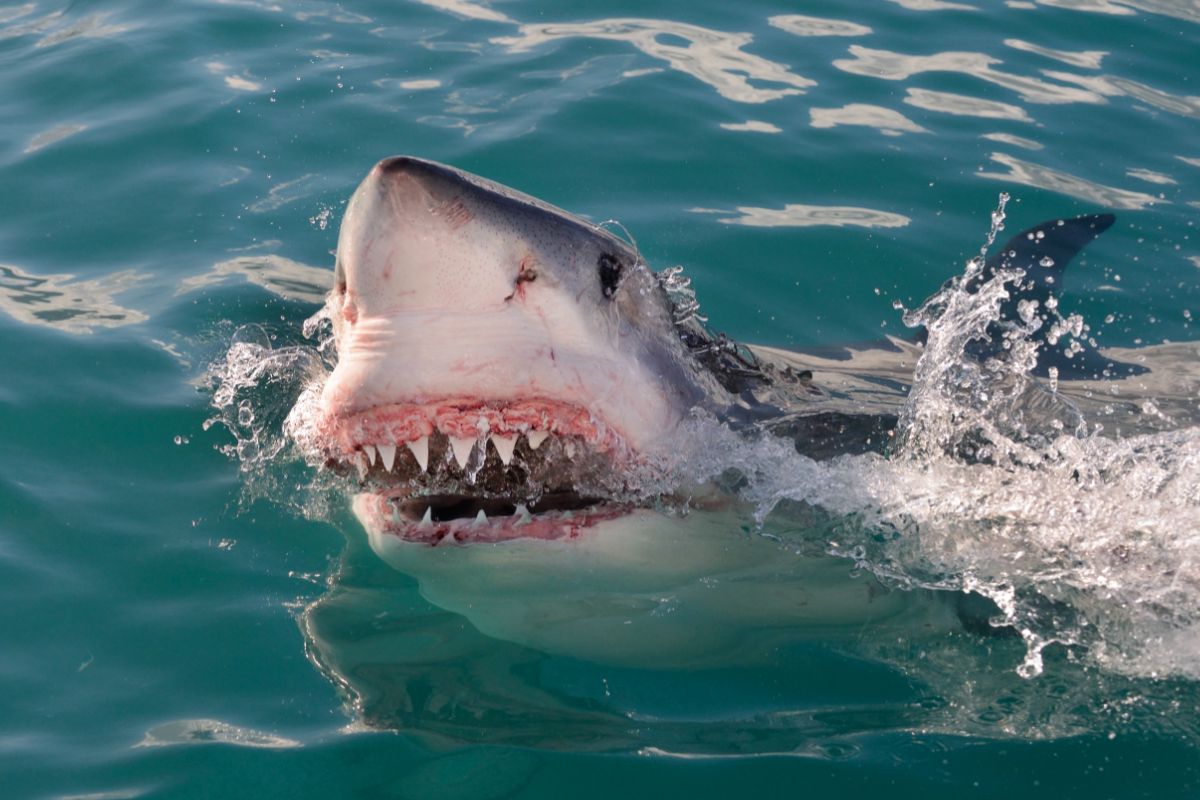Sharks are intriguing, magnificent creatures, known for their massive, lethal teeth. But do they have tongues?
If you’ve seen photos or videos of orca whales poking out their tongues, it’s not a far leap to wonder if sharks do the same or if they even have tongues at all.

Well, that’s what we’re going to find out in this article!
Basically, sharks possess a basihyal which is a piece of cartilage that is found at the bottom of their mouth, and this is what acts as a shark’s tongue.
Sharks are not the only fishes that have basihyals. They look pretty much like a tongue, but unlike a human tongue, a basihyal doesn’t have taste buds.
Plus, a basihyal is not muscular like a human tongue, and isn’t flexible and is unable to move around as much.
So now we know what a shark’s equivalent of a tongue would be, let’s take a look at why they need their tongues, and how much they eat per day.
But first, let’s explore what the diet of a shark actually is.
The Diet Of A Shark
Sharks are known for being carnivores, and incredibly skilled predators. Unsurprisingly, they are considered apex predators in their natural habitats.
Still, there are some shark species that are perfectly happy to feed on plankton. There are many unique shark species out there, with unique feeding habits.
However, the biggest factor in determining the diet of a shark is what kind of prey they have available.
Sharks are incredibly intelligent animals which can easily adapt to their environment when needed.
So if their preferred prey is unavailable, they will instead hunt something else. However, this isn’t always a good thing, especially as our oceans become more polluted.
If they can’t eat their preferred prey, sharks will eat coal, oil, garbage, and discarded clothing which can be damaging to their health.
What Do Sharks Like To Eat The Most?
Sharks mainly eat crustaceans, fish, and mollusks, and larger sharks will also eat dolphins, seals, sea lions and other large mammals.
Some Sharks are pickier than others though, and have specific prey they like to target.
For example, Tiger Sharks like to eat turtles, while Hammerhead Sharks love stingrays.
Some sharks like the Cookiecutter Shark use their tongue to tear their prey into species, while some larger sharks can just swallow their prey whole!
How Do Sharks Hunt?
Many sharks are predators who use ambush tactics like camouflaging to catch their prey. Some sharks will hunt in groups, while others will hunt alone.
Some will even collaborate with other species to capture more prey than they would alone.
Carnivorous sharks are of course known for their sharp teeth, which helps them to cut the flesh of their prey quickly.
These teeth can even pierce the prey’s bones. However, there are some sharks that don’t eat animals at all. For example, planktivore sharks will instead eat plankton.
The Basking Shark, the Megamouth Shark, and the Whale Shark are examples of planktivore sharks. These sharks suck up water and filtrate the food for its nutrients.
Plankton are tiny organisms, and are just 1 millimeter long.
It might be hard to wrap your head around how such a large animal like a shark can feel full after eating something so small.
Well, the shark will catch the plankton via long filaments on their body until they’ve accumulated a large amount of plankton.
They can even swallow around 2 kg of plankton every hour. Therefore, planktivore sharks eat without using their tongues or their teeth.
Why Do Sharks Have Tongues?

Unlike a human tongue, the basihyal isn’t a movable muscle and is believed to have originated in order to protect the ventral aorta that is incredibly close to the mouth and can be impacted by large amounts of live prey.
Shark tongues do not have taste buds, but instead they sense taste using the papillae lining found in their throat and their mouths.
These versions of taste buds help them to discern whether prey is safe to eat or not before they swallow it.
Is A Shark Able To Stick Out Its Tongue?
No, sharks are unable to stick out their tongue, and this is because their tongue is attached to the bottom of their mouths.
This is because their tongues are mainly made of cartilage that is not very flexible.
Therefore, sharks can’t stick out their tongues as they can’t stretch the cartilage and poke it out of their mouths.
Unlike other animals, they do not have to use their tongues to grab their prey. One way that sharks can catch their prey is via electroreceptors.
Sharks are not as creative with their tongues as other predators when catching prey, as they’re not long enough and are not flexible enough.
However, they can create a vacuum with their mouths to suck in their prey.
How Much Do Sharks Eat Every Day?
Since sharks are such huge creatures, it’s natural to conclude that they have large diets. However, sharks only eat around 0.5% to 3.0% of their weight each day.
The reason they don’t eat more food every day is because they’re not capable of chewing, and need a while to digest everything that they have swallowed.
A shark has a very different digestive system when compared to a mammal’s. For example, they have very small intestines and a spiral valve inside a short section.
Therefore, sharks do not eat daily. Some can go for a couple of weeks without eating, and some sharks can go for months without eating.
A shark’s version of taste buds play a crucial role in deciding if something is edible or not.
Sharks will take a small bite of their food at first, and if the taste is unpleasant or suggests something is dangerous, then they will spit the food out.
This is why when sharks attack humans, they will usually one bite them once as humans are not their usual prey.
Final Thoughts
So there you have it!
Sharks do not have tongues in the way that we and other animals have them, but they do have a piece of cartilage called a basihyal that acts like a tongue and helps sharks to hunt and survive, either by relying on their taste buds to determine if a food is safe to eat, or by cutting up their prey in the case of the Cookiecutter Shark.
- Is It Possible For A Shark To Swim Backwards? - August 2, 2024
- Are Leopard Sharks Dangerous? - August 2, 2024
- What Are The Differences Between Shark And Dolphin Fins? - August 1, 2024








